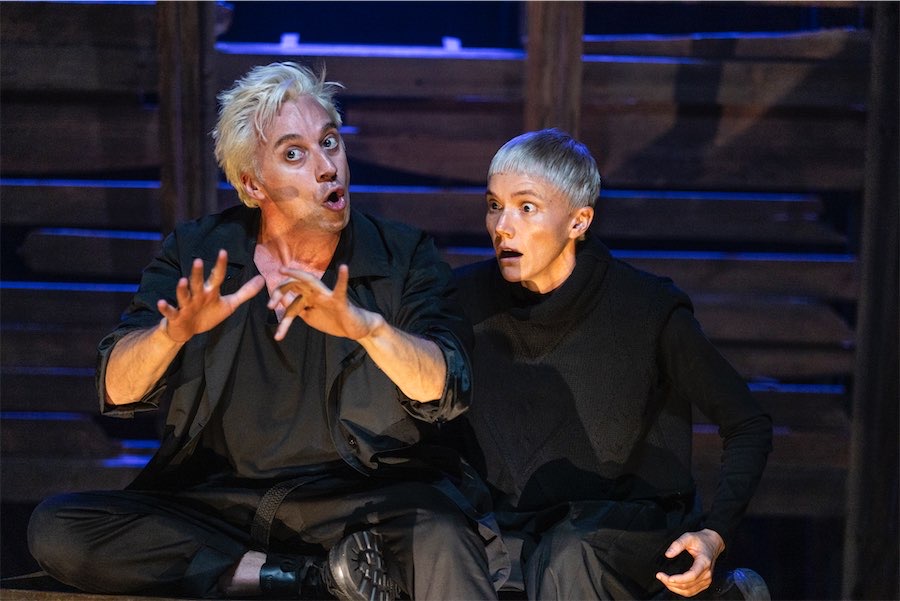
Famous British-Australian actor Richard Pyros is playing King Theseus and his “shadow” counterpart Oberon, king of the fairies, in Bell Shakespeare’s coming production of A Midsummer Night’s Dream.
Pyros has starred opposite Cate Blanchett in Big and Small, which toured to Europe, played in Hedda Gabler for the Royal National Theatre and appeared as a regular in the Hulu comedy-drama TV series, The Great.
He tells me he believes that the darkness of his character was all part of a masterplan by Shakespeare to parallel the worlds of humans and fairies.
“The fairies are quite dark, capricious and manipulative, happy to use humans as puppets for their own whimsy in a dark version of control,” he says. To put it in a nutshell, Oberon is not a nice guy.
Threatening and overbearing towards his wife Titania, his obsessive need to possess the little Indian boy she has adopted leads him to play a monstrous trick on her.
Oberon sends his servant Puck off to pluck a magic flower, the juice of which leads to Titania’s falling “in love” with – and let’s face it, have sex with – a creature, in reality the Athenian workman Bottom transformed into an ass by Puck just for a bit of fun. Hilarious, or not?
It occurs to Pyros in fact that the barbaric sense of humour leading Oberon to play this trick – it succeeds and he gets the Indian boy – indicates to us that something is amiss in the world of the fairies, human emotion.
Shakespeare addresses this as he steers the play towards a dodgy happy ending, for what has been going on in the forest during the preceding night gives little cause for optimism about either human nature or the course of true love.
Pyros, like me, is a great fan of “The Dream” and it pains him to think how dry and boring it often is in schools.
Kids, he believes, would get a lot more out of it if they acted it out loud.
“It’s such a phenomenal play but in some ways it’s almost incomprehensible as all the characters reflect on another.”
Director Peter Evans’ production turns much of the action into a play-within-a-play.
“The whole play is about role-playing – everyone plays a role in their lives, but this asks what are the forces outside our control?”
As for Oberon’s obsession with the little changeling boy, right at the start Pyros and Evans did a lot of digging around.
“I think there has to be something deeper in this. His idea of the changeling boy is wrapped up in the idea of relationships and the concept of love itself,” he says.
“There’s something quite radical in A Midsummer Night’s Dream,” Pyros thinks, noting how Oberson callously toys with the madness of bestiality and with the physicality between two beings – “he makes his wife have sex with a donkey”.
“In our version, he realises what he has done, he almost feels sorry for what he’s done, telling Titania: ‘Now thou and I are new in amity’.
“The play suggests that there has to be a new moment in their lives, but the dream is important, too.”
Maybe, Pyros posits, it suggests that we should be more interested in our artists, the keepers of our dreams.
Bell Shakespeare’s A Midsummer Night’s Dream, The Playhouse, June 7-15.
Who can be trusted?
In a world of spin and confusion, there’s never been a more important time to support independent journalism in Canberra.
If you trust our work online and want to enforce the power of independent voices, I invite you to make a small contribution.
Every dollar of support is invested back into our journalism to help keep citynews.com.au strong and free.
Thank you,
Ian Meikle, editor




![For graphic designer Tracy Hall, street art is like any artwork, her canvas has been swapped out for fences and plywood, her medium changing from watercolours to spray paint.
A Canberra resident for 13 years, Tracy has been a street and mural artist for the past five.
Her first exploration into grand-scale painting was at the Point Hut toilets in Banks five years ago. “They had just finished doing up the playground area for all the little kids and the words [of graffiti] that were coming up weren’t family friendly,” she says.
“So I ended up drawing this design and I got approval for the artwork.”
Many of Tracy’s time-consuming artworks are free, with thousands of her own dollars put into paint.
@traceofcolourdesigns
To read all about Tracy's fabulous street art, visit our website at citynews.com.au or tap the link in our bio! 🎨🖌
#canberranews #citynews #localstories #canberrastories #Citynews #localnews #canberra #incrediblewomen #journalism #canberracitynews #storiesthatmatter #canberralocals #artist #streetart #streetartist #StreetArtMagic](https://citynews.com.au/wp-content/uploads/sb-instagram-feed-images/490887207_1225841146218103_6160376948971514278_nfull.webp)



Leave a Reply